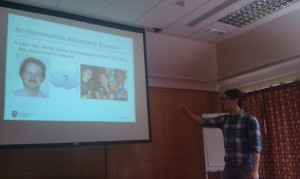Abstract
As the Internet becomes increasingly important to all aspects of society, the consequences of disruption are increasingly severe. Thus it is critical to increase the resilience and survivability of the future networks in general, and the Internet in particular. We define resilience as the ability of the network to provide desired service even when the network is challenged by attacks, large-scale disasters, and other failures. Resilience subsumes the disciplines of survivability, fault-tolerance, disruption-tolerance, traffic-tolerance, dependability, performability, and security. After an introduction to the disciplines and challenges to network resilience, this presentation will discuss analytical, simulation, and experimental emulation techniques for understanding, evaluating, and improving the resilience of the Future Internet. This includes a multilevel state-space based approach that plots network service delivery against operational state that is the basis for both mathematical- and simulation-based analysis, and approaches that embed fundamental properties such as redundancy and diversity into all aspects of network structure, mechanism, and protocols. A set of tools to help in this analysis has been developed: KU-LoCGen (Location and Cost-Constrained Topology Generation), KU-TopViwe (Topology Viewer), and KU-CSM (Challenge Simulation Module). Plans to experimentally evaluate resilience include using the international programmable testbed GpENI: Great Plains Environment for Network Innovation.
Bio:
James P.G. Sterbenz is Associate Professor of Electrical Engineering & Computer Science and a member of technical staff at the Information & Telecommunication Technology Center at the University of Kansas, and is a Visiting Professor of Computing in InfoLab 21 at Lancaster University in the UK. He has previously held senior staff and research management positions at BBN Technologies, GTE Laboratories, and IBM Research. His research interests include resilient, survivable, and disruption tolerant networking, future Internet architectures, active and programmable networks, and high-speed networking and components. He is director of the ResiliNets Research Group, currently PI in the NSF-funded FIND and GENI programs, the EU-funded FIRE ResumeNet project, leads the GpENI international programmable network testbed project, and leads a US DoD project in highly-mobile ad hoc disruption-tolerant networking. He received a doctorate in computer science from Washington University in 1991. He has been program chair for IEEE GI, GBN, and HotI; IFIP IWSOS, PfHSN, and IWAN; and is on the editorial board of IEEE Network. He is principal author of the book High-Speed Networking: A Systematic Approach to High-Bandwidth Low-Latency Communication.
Event details
- When: 12th July 2011 14:00 - 15:00
- Where: Cole 1.33a
- Format: Seminar


